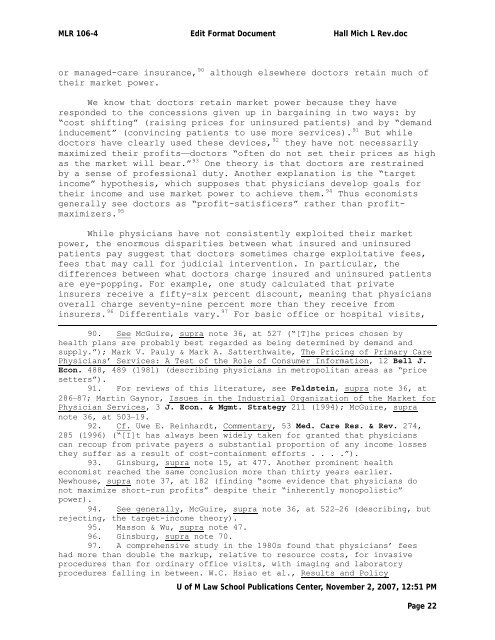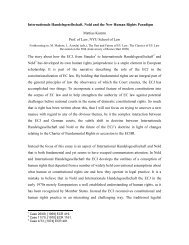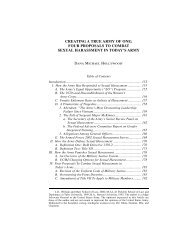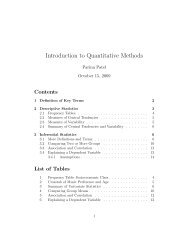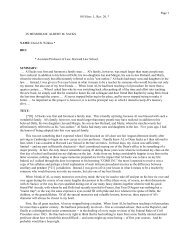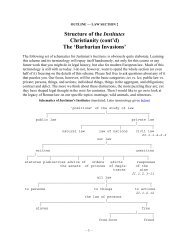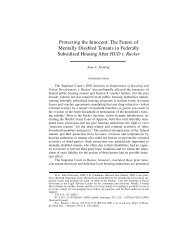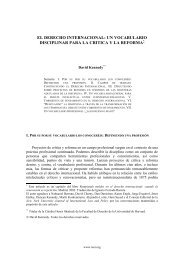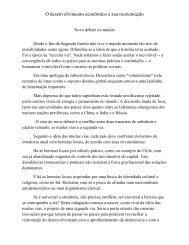Patients as Consumers - Harvard Law School
Patients as Consumers - Harvard Law School
Patients as Consumers - Harvard Law School
Create successful ePaper yourself
Turn your PDF publications into a flip-book with our unique Google optimized e-Paper software.
MLR 106-4 Edit Format Document Hall Mich L Rev.doc<br />
or managed-care insurance, 90 although elsewhere doctors retain much of<br />
their market power.<br />
We know that doctors retain market power because they have<br />
responded to the concessions given up in bargaining in two ways: by<br />
“cost shifting” (raising prices for uninsured patients) and by “demand<br />
inducement” (convincing patients to use more services). 91 But while<br />
doctors have clearly used these devices, 92 they have not necessarily<br />
maximized their profits—doctors “often do not set their prices <strong>as</strong> high<br />
<strong>as</strong> the market will bear.” 93 One theory is that doctors are restrained<br />
by a sense of professional duty. Another explanation is the “target<br />
income” hypothesis, which supposes that physicians develop goals for<br />
their income and use market power to achieve them. 94 Thus economists<br />
generally see doctors <strong>as</strong> “profit-satisficers” rather than profitmaximizers.<br />
95<br />
While physicians have not consistently exploited their market<br />
power, the enormous disparities between what insured and uninsured<br />
patients pay suggest that doctors sometimes charge exploitative fees,<br />
fees that may call for judicial intervention. In particular, the<br />
differences between what doctors charge insured and uninsured patients<br />
are eye-popping. For example, one study calculated that private<br />
insurers receive a fifty-six percent discount, meaning that physicians<br />
overall charge seventy-nine percent more than they receive from<br />
insurers. 96 Differentials vary. 97 For b<strong>as</strong>ic office or hospital visits,<br />
90. See McGuire, supra note 36, at 527 (“[T]he prices chosen by<br />
health plans are probably best regarded <strong>as</strong> being determined by demand and<br />
supply.”); Mark V. Pauly & Mark A. Satterthwaite, The Pricing of Primary Care<br />
Physicians’ Services: A Test of the Role of Consumer Information, 12 Bell J.<br />
Econ. 488, 489 (1981) (describing physicians in metropolitan are<strong>as</strong> <strong>as</strong> “price<br />
setters”).<br />
91. For reviews of this literature, see Feldstein, supra note 36, at<br />
286–87; Martin Gaynor, Issues in the Industrial Organization of the Market for<br />
Physician Services, 3 J. Econ. & Mgmt. Strategy 211 (1994); McGuire, supra<br />
note 36, at 503–19.<br />
92. Cf. Uwe E. Reinhardt, Commentary, 53 Med. Care Res. & Rev. 274,<br />
285 (1996) (“[I]t h<strong>as</strong> always been widely taken for granted that physicians<br />
can recoup from private payers a substantial proportion of any income losses<br />
they suffer <strong>as</strong> a result of cost-containment efforts . . . .”).<br />
93. Ginsburg, supra note 15, at 477. Another prominent health<br />
economist reached the same conclusion more than thirty years earlier.<br />
Newhouse, supra note 37, at 182 (finding “some evidence that physicians do<br />
not maximize short-run profits” despite their “inherently monopolistic”<br />
power).<br />
94. See generally, McGuire, supra note 36, at 522–26 (describing, but<br />
rejecting, the target-income theory).<br />
95. M<strong>as</strong>son & Wu, supra note 47.<br />
96. Ginsburg, supra note 70.<br />
97. A comprehensive study in the 1980s found that physicians’ fees<br />
had more than double the markup, relative to resource costs, for inv<strong>as</strong>ive<br />
procedures than for ordinary office visits, with imaging and laboratory<br />
procedures falling in between. W.C. Hsiao et al., Results and Policy<br />
U of M <strong>Law</strong> <strong>School</strong> Publications Center, November 2, 2007, 12:51 PM<br />
Page 22


